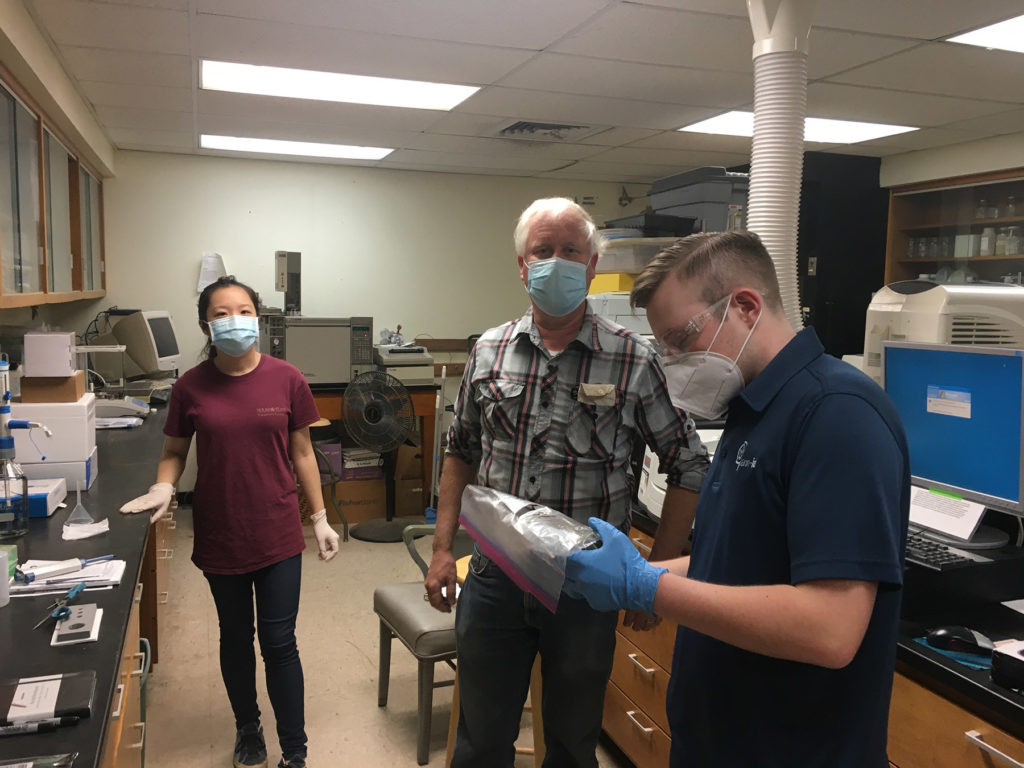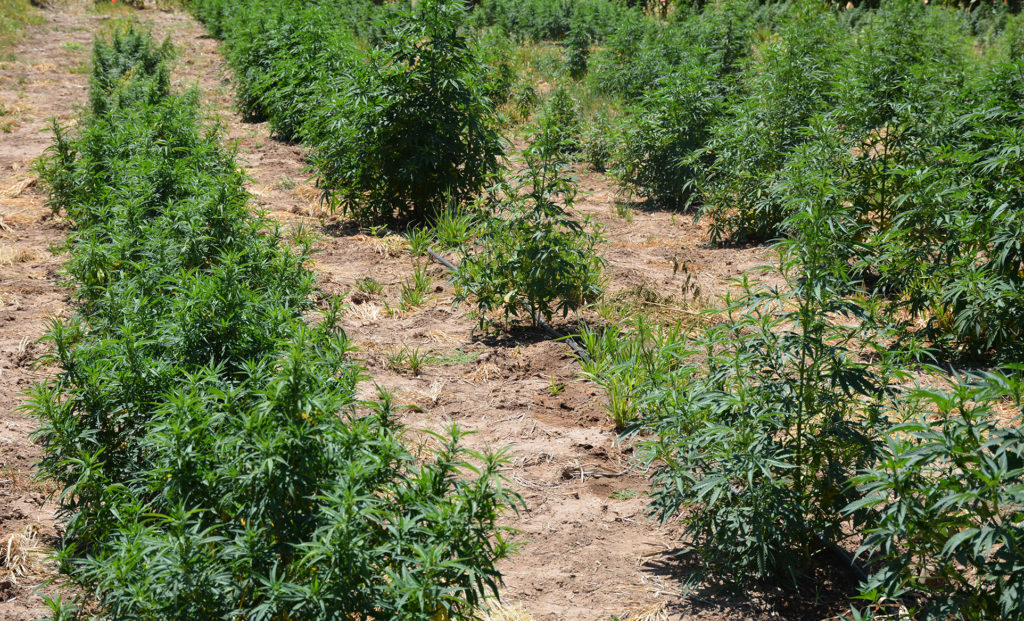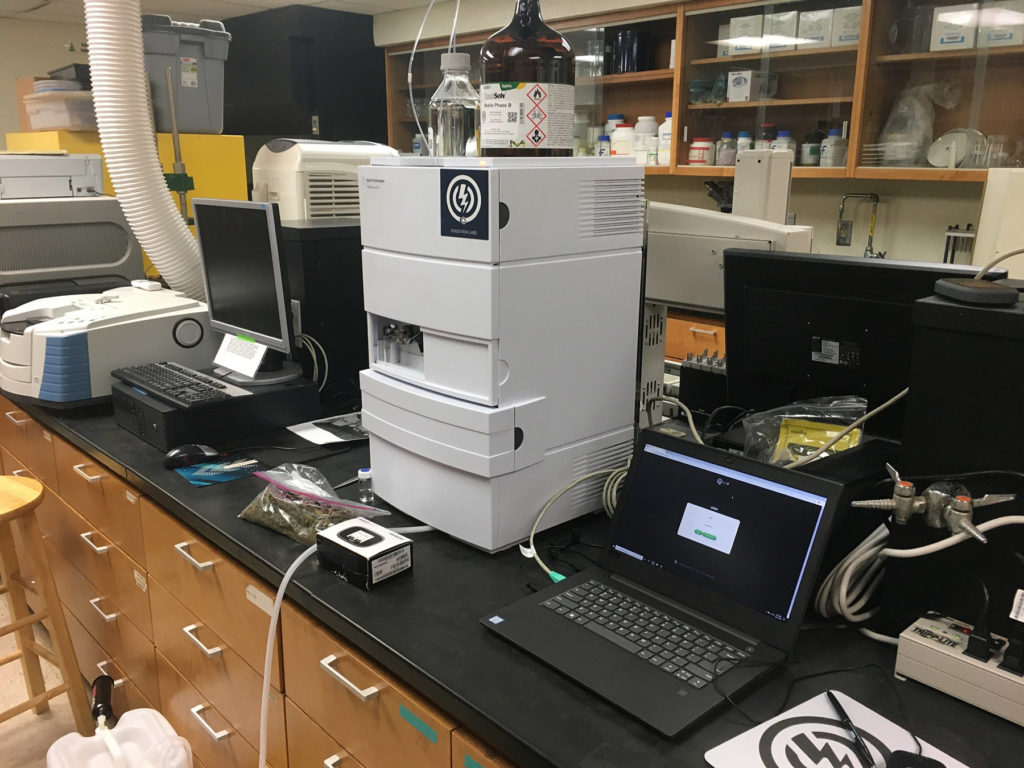Growing-season hemp potency testing available through Texas A&M AgriLife
Three locations can conduct preliminary tests for management purposes
The ability to conduct potency tests for the state’s newcomer crop – hemp – during the growing season is coming to Texas A&M AgriLife soon with the new Texas A&M AgriLife Hemp Testing Service.
Hemp testing software provided in a collaboration with Ionization Labs will allow the Texas A&M AgriLife Extension Service to have the in-season testing capability at three different centers – Lubbock, Uvalde and Bryan-College Station, said Tony Provin, Ph.D., who oversees the AgriLife Extension Soil, Water and Forage Testing Laboratory in Bryan-College Station.

“While we have one of the best soil, water and forage testing laboratories in the nation, our ability to test for various cannabinoid compounds in hemp was limited,” said Larry Redmon, Ph.D., AgriLife Extension program leader for the Department of Soil and Crop Sciences, Bryan-College Station. “With this new partnership with Ionization Labs, we no longer have that limitation and look forward to helping Texas hemp producers with our new capabilities.”
Redmon leads the Industrial Hemp Education Initiative Team created by Texas A&M AgriLife in the College of Agriculture and Life Sciences.
Cree Crawford, co-founder/president of Ionization Labs, Austin, said they are excited to collaborate with Texas A&M AgriLife to bring fast and effective potency results through their Cann-ID testing solution. The Cann-ID allows testing for a full list of cannabinoids and narcotic tetrahydrocannabinol concentration, THC, levels to track compliance levels.
“By deploying Cann-ID at selected strategic Texas A&M AgriLife locations, we will help provide Texas hemp farmers with a powerful tool that can support their cultivation best practices and overall success with this new crop,” Crawford said.
Tools to meet federal/state rules and regulations
According to the U.S. Department of Agriculture finalized federal regulations and guidelines and those approved by the Texas Department of Agriculture, THC concentrations cannot be more than 0.3% on a dry weight basis or the crop must be destroyed.
All hemp growers in Texas must have a license, which requires a background check and third-party crop testing to validate THC levels. The Texas Department of Agriculture offers a list of registered hemp laboratories.
“We will be able to test our own internal research samples and samples for the general public,” Provin said. “However, these tests will not be the ‘accredited laboratory’ sample needed in the final stages of growth for legal purposes. This will be more for day-to-day management to aid in altering the profile of THC, because as we know, increasing stresses such as drought can change the THC profile.”
He said AgriLife Extension is working to improve Texas producers cultural management practices and also support ongoing research by the agencies.
“We know as much as 10%-20% of the production is often hot and has to be destroyed,” Provin said. “We hope through our research and variety trials to help producers come up with management practices that will allow them to salvage their investment.”
Learning to grow hemp
Calvin Trostle, Ph.D., AgriLife Extension statewide hemp specialist and agronomist, Lubbock, said TDA issued in the range of 1,350 licenses for 5,500 acres in 2020. It appears one-third or more of those acres were never planted this first year, mostly because of timing – it was too late in the year when later applicants received their licenses.
Three different types of hemp varieties are being grown: cannabinoids or those for CBD, grain and fiber varieties, Trostle said. He is in the process now of surveying 2020 growers to determine if they will grow hemp in 2021 and what they will do differently.

“As for our AgriLife Extension variety trials, we had a tough time,” Trostle said. “Four of the six fiber lines we planted went into very premature flowering. They were planted further south than ever planted, and day lengths were much different. We learned a lot and we know what we will do to improve our testing next year.”
Moving forward, he said it might be necessary for AgriLife Extension to mimic different planting dates in the greenhouse to test how different varieties will perform in Texas conditions prior to the 2021 cropping season.
“Having the Ionization Lab here in Lubbock will be good,” Trostle said. “A farmer should be testing their hemp probably on a weekly basis to understand where the THC is beginning to rise and when it is approaching 0.2%. If it reaches that point, it is near harvest. You don’t want it to get hot and be worthless.”
Once a grower starts to feel buds in the head, Trostle said they should wait a week and then start testing once a week moving forward. While he said they are just testing their research variety plot samples, they are aware many producer plots tested hot.
“I absolutely know some things we will do different next year,” Trostle said. “In San Angelo, four of the plots were planted with transplants, and they struggled with the heat. Once established, though, we were impressed with the relative uniformity. The seeded varieties, however, were not uniform and would have presented a problem for harvesting timing.”
Bringing testing to the masses
Ionization Lab is an agricultural technology company with a centralized research, development and TDA-licensed testing service lab in Texas. The company has been in business for five years and has deployed Cann-ID commercially with hemp growers, producers/extractors and other hemp industry professionals in 12 states with active hemp programs, Crawford said.

Crawford said Ionization Labs conducted several hundred tests this year in Austin after receiving their approval in August, and they saw many samples “pop hot” as producers navigated the learning curve. That’s why they wanted producers to have the ability to do quality assurance/quality control during the growing cycle.
“In this unique relationship, we deployed a unit with Dr. Provin for the past year and then developed the opportunity from there,” he said. “A second lab was installed at the Texas A&M AgriLife Research and Extension Center near Lubbock at the end of October and we are working to get one installed in Texas A&M AgriLife center at Uvalde.
“As a company, we feel it is important to work with the researchers and help accelerate the understanding and working with a system that is already in place. The platform allows producers a greater education, and a level of comfort and understanding to the community.”
Alex Andrawes, co-founder/CEO of Ionization Labs, Austin, said the collaboration will allow producers to get data faster because they will be closer to the information. Getting chemical data as fast as possible on the cannabinoids in the plant is important for contracting purposes and allows producers to harvest at the optimum time.
“Our intention from inception to today is to provide all stakeholders an accurate, reliable and cost-effective system to test their crop or processed cannabinoid derivative products. We knew this would start and end with cost effective, rapid, high frequency cannabinoid testing,” Andrawes said. “Collaboration in precision farming research and practices to support our Texas farming community and hemp farmers is a core focus of Ionization Labs, and we are elated to work with Texas A&M AgriLife to achieve this goal.”


